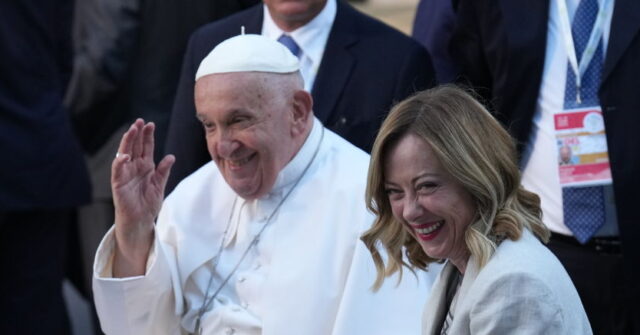European political leaders moved to express their memories, condolences, and hopes on Monday as the news of the passing of Pope Francis earlier that morning.
Much of Europe has, historically, been Catholic and remains officially so even amid the recent decades of change, excepting the Orthodox East and Protestant north. In Paris, the bells of the recently restored Notre Dame rung out 88 times for the Pope’s 88 years of age, and the Eiffel Tower will not be illuminated this evening. In churches throughout Catholic Austria, bells will rung simultaneously for ten minutes this afternoon and football matches planned for today across Italy are cancelled in mourning.
Appropriately the Prime Minister of Italy Giorgia Meloni — the Trump-adjacent right-wing populist recently hailed as the most consequent national leader inside the European Union — led reactions from the European political class to the announcement of the death of Pope Francis on Monday.
In a statement Catholic-faith politician Meloni said: “Pope Francis has returned to the Father’s house… [leaving us] without a great man and a great shepherd. I had the privilege of enjoying his friendship, his advice, and his teachings, which never faltered even in moments of trial and suffering”.
The Pope asked the world to follow a path “that does not destroy, but cultivates, repairs, safeguards”, she recalled, concluding: “We bid farewell to the Holy Father with hearts full of sorrow, but we know that he is now in the peace of the Lord.”
Also from Italy came remarks from the President, Sergio Mattarella who reflected on void left by the Pontiff, saying this “arouses pain and emotion among Italians and throughout the world.”
In the United Kingdom Buckingham Palace published a statement from King Charles III which went into rather more detail than many of the politicians’ across the continent. Expressing the deep sadness of the Royal Family at the death of the Pope, the King said “our heavy hearts have been somewhat eased” by knowing the Pope was able to celebrate Easter before his passing.
“His Holiness will be remembered for his compassion, his concern for the unity of the Church and for his tireless commitment to the common causes of all people of faith, and to those of goodwill who work for the benefit of others”, the King said.
Several politicians of this historically Protestant nation also made remarks, including Prime Minister Sir Keir Starmer who spoke of “the pope for the poor” and Brexit leader Nigel Farage who said in his usual relationships-focussed style: “I met him and liked him very much”.
In Germany, outgoing left-wing Chancellor Olaf Scholz said: “the Catholic Church and the world lose an advocate for the weak, a reconciler, and a warm-hearted person. I greatly appreciated his clear perspective on the challenges that concern us. My condolences go out to the faithful worldwide”. His replacement, the soon-to-be confirmed incoming Chancellor Friedrich Merz said the news of the death of the Pope left him feeling “deep sorrow” and noted “Francis will be remembered for his tireless commitment to the weakest in society, for justice and reconciliation”.
Austria’s President Alexander Van der Bellen’s memorialisation of the Pope remembered particularly that he had “travelled to Lampedusa to meet with the refugees… time and again, he directed a spotlight wherever he saw the well-being of people threatened. Be it through war, dictatorship, or climate change.”
France’s Emmanuel Macron struck similar notes, stating: “From Buenos Aires to Rome, Pope Francis wanted the Church to bring joy and hope to the poorest. To unite people with one another and with nature. May this hope be reborn endlessly beyond him.”
From Europe’s predominantly Orthodox east, Ukraine’s President Volodymyr Zelensky noted millions would mourn the death of Pope Francis, stating: “He knew how to give hope, ease suffering through prayer, and foster unity. He prayed for peace in Ukraine and for Ukrainians. We grieve together with Catholics and all Christians who looked to Pope Francis for spiritual support. Eternal memory!”.
Read the full article here
